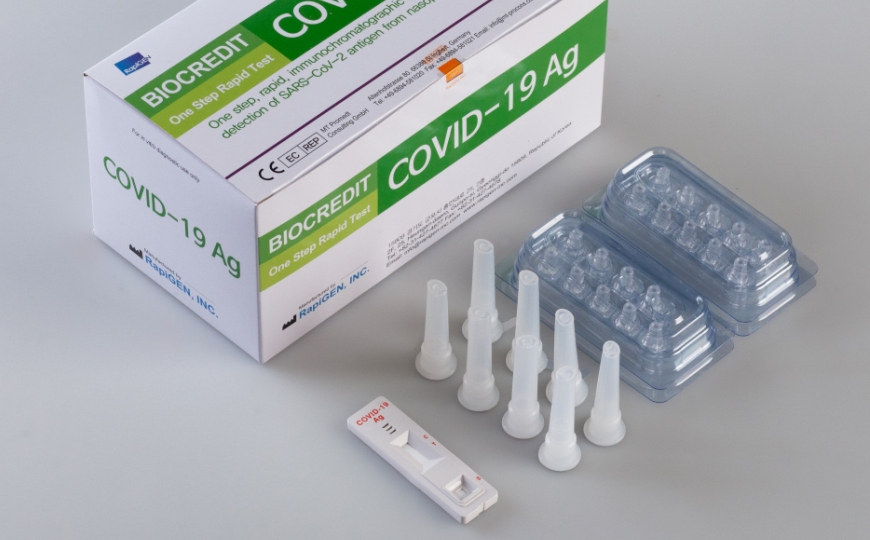Express COVID-19 testing for patients with ARVIs will be made mandatory
10/06/2021

Anastasia Rakova, Deputy Mayor for Social Development and the head of Moscow's operational headquarters, told reporters about new testing rules. “The tests are highly sensitive: in 85% of cases, their results are identical to PCR tests. […] This approach allows us to quickly establish a diagnosis, meaning that we can start treatment on the same day—a critical criterion for fighting COVID-19. Rapid antigen tests yield results in less than half an hour, right at home or in a medical facility.
Instructions on the use of rapid diagnostic methods—specifically, tests that detect IdA, IgM and IgG antibodies and SARS-CoV-2 antigens—to detect coronavirus infections in symptomatic individuals are featured in the updated version of the Ministry of Health’s methodological recommendations from September 3. These instructions are also included in the current version from September 22. Vademecum notes that industry representatives consider this decision a ‘progressive regulatory policy.’”
Anastasia Rakova stressed that rapid testing for COVID-19 antigens will be offered both for those who have contracted the disease and for those who live with them (in the event of a positive result). Along with rapid testing, patients will still be given a PCR test.
The reasons for this decision are clear. The RT-PCR test only takes an hour and a half, but transportation to the laboratory and the queue of tests means that Moscow residents only receive results within a few days. In commercial laboratories, performing the test faster is possible for a substantial fee.
It is clear that during the fourth wave of infections, this lead time is unacceptable. During this time, the infected person can transmit the virus to all of their relatives, friends and colleagues. With this in mind, the use of express tests is very progressive. But will it be discredited if low-quality tests with a high percentage of erroneous results are used?
Unfortunately, this scenario is eminently possible. For example, in Russia, you can purchase Beijing Lepu Medical Technology’s SARS-CoV-2 Antigen Rapid Test Kit. It is entirely legal, as the test is registered in the Russian Federation. However, the US Food and Drug Administration (FDA) issued a warning in May 2021 that "there is a high risk of false results when using this test." Incidentally, a second low-quality product by the same company mentioned in this document, the Leccurate SARS-CoV-2 Antibody Rapid Test Kit, is also widely available in Russia.
We learned from the leading Russian distributor, Avivir about which antigen tests can be trusted. COVID-19 antigen tests offered by Avivir yield results in 8-15 minutes. Their offerings include a test that detects COVID-19 in saliva samples, eliminating the need for a patient to understand how to take a nasal swab. PCR.NEWS has already written about the BIOCREDIT COVID-19 Ag, the first express test for SARS-CoV-2 antigens, which was permanentlyregistered in Russia. Its producer, the Korean company Rapigen, also offers an rapid antibody test, BIOCREDIT DUO COVID-19 IgM/IgG.
“The products we offer in Russia are already in use by the Moscow healthcare system,” according to Avivir press secretary Marina Itina. “As far as we know, our distributors have also guaranteed supply of the highly accurate Abbott, Wells Bio and RapiGEN tests. These are the best products of their kind, with the greatest accuracy available. Moreover, they have undergone additional clinical trials, including at the Gamalea Institute, and have proven their effectiveness in detecting all current strains, including Delta and Delta-Plus. Eventually, a study will be published in the largest international scientific publication showing that their diagnostic effectiveness has been proven to be on a par with PCR.”
“How do low-quality express tests appear on the market?”
“Unfortunately, there is a deplorable situation on the market right now. Government agencies have recently discovered that they have low-quality diagnostic tools. Some non-professional organizations have imported and registered countless products of questionable quality. At the time of certification, the product may be entirely different from what is eventually produced and delivered to institutions. These kits are useless. They also lower the purchase price to a level that we cannot match, no matter how much we would like to—even lower than the cost of production. There was a similar situation in Europe, but licenses for these products were quickly revoked. The situation is also similar in the United States: if you follow the FDA website, changes are made almost every week, usually to shorten the list of permitted products. We hope that additional regulatory mechanisms will appear in Russia as well. On the subject of testing symptomatic individuals, this is by far the most useful experiment and the most advanced in the world. At the moment, Moscow is armed with high-quality diagnostic tools; as far as the future is concerned, it is difficult to comment.”
Загрузить ещё